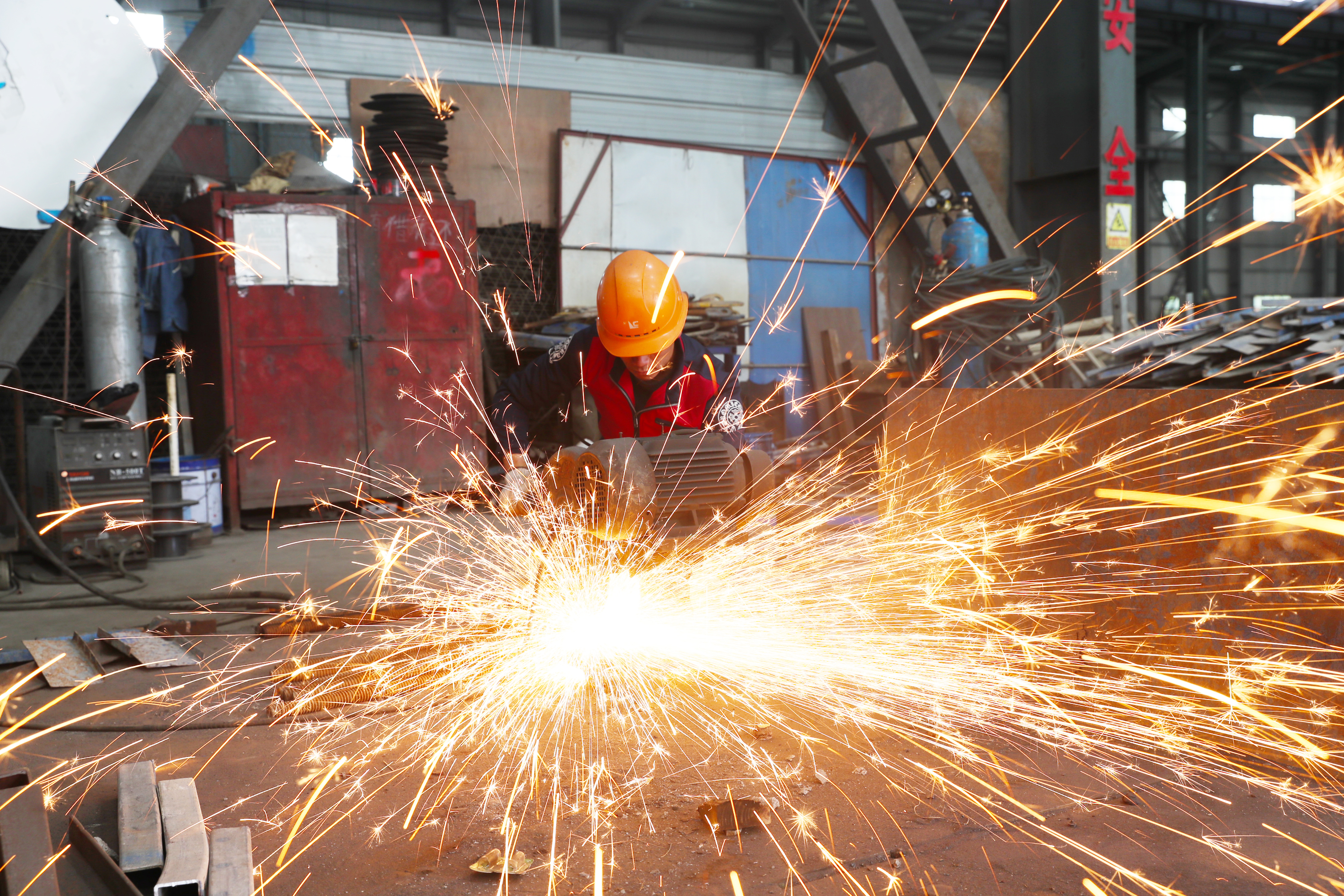A staff member works at a workshop in an engineering machinery company in Xintian County of Yongzhou City, central China's Hunan Province, Feb. 13, 2023. (Photo by Liu Guixiong/Xinhua) While the specter of recession haunts the world, China has stimulated more hopes for a broader economic revival following its decisive victory in the three-year-long fight with COVID-19. Hailing the victory as "a miracle in the history of human civilization," the Chinese leadership noted at a recent meeting that the country has made a smooth transition in COVID-19 response in a relatively short time and successfully pulled through the pandemic with the lowest fatality rate in the world. Meanwhile, the steady growth of the Chinese economy over the past three years has added further evidence of the country's victory in fighting the epidemic. From 2020 to 2022, China posted an annual average growth rate of 4.5 percent, outpacing the global average, and much higher than that of major economies such as the United States and Germany. With the impact of the virus generally diminished, China has seen consolidated momentum for economic recovery. From quickened production activities to a rebound in consumption, various indicators have projected a brighter outlook for the world's second largest economy. COORDINATED EFFORTS Analysts have attributed China's leading performance to effective coordination in simultaneously battling COVID-19 and its economic fallout. To cope with the constantly evolving epidemic situation, China has been dynamically optimizing its control measures. It has so far issued 10 editions of COVID-19 control protocols and timely downgraded its COVID-19 management due to Omicron being less pathogenic and deadly. Institutional strengths, such as the mobilization of resources to accomplish major initiatives, enabled the nation to tackle waves of infections quickly nationwide, effectively safeguarding the lives and health of its 1.4 billion population at a minimal cost. On the economic development front, the country has rolled out a string of supportive policies to shore up economic resilience. Among these measures are ramped-up efforts to expand tax and fee incentives and supportive policies to enterprises, offering a "timely rain" to companies facing financial drought. While inflation is a serious cause for concern faced by many major economies, China has kept its CPI growth at 2 percent in 2022, a relatively low level globally. A total of 11.86 million, 12.69 million and 12.06 million new urban jobs were created in 2020, 2021 and 2022, respectively, all surpassing the targets set for each year. With an increasingly complete industrial system, more resilient industrial and supply chains, and an improved ability to ensure the security of food, energy and resources, China now enjoys strong tenacity in the face of headwinds and a more solid material foundation for generating recovery momentum. Despite the unprecedented challenges, the economy grew 3 percent year on year to a record high of 121 trillion yuan (about 17.65 trillion U.S. dollars) in 2022, a new and higher level in terms of economic aggregate after the Chinese economy topped the thresholds of 100 trillion yuan and 110 trillion yuan in 2020 and 2021, respectively. "The key to the stable economic performance lies in the targeted COVID response and effective coordination," said Dong Yu, executive vice president of the China Institute for Development Planning at Tsinghua University, adding that the economy is bound to see an overall upturn with the policy coordination taking effect. BRIGHTENED OUTLOOK The reemerging hustle and bustle across the country has painted an inspiring picture of China's economy, indicating that the worst has passed. The just-concluded Spring Festival travel rush, a mass-migration event marking the celebration of the Chinese New Year, witnessed more than 1.5 billion trips made by rail, highways, waterways and civil aviation in 40 days. The figure marked a 50.5-percent increase over the same period in 2022. The pace of business activity is picking up. Production lines in factories nationwide are running at full throttle as orders pour in. Many cities, including Beijing and Shanghai, are launching recruitment campaigns to satisfy the surging demand for labor. The latest data attests to China's rising allure to foreign investors. Foreign direct investment in the Chinese mainland, in actual use, expanded 10 percent year on year to 19.02 billion U.S. dollars in January, data from the Ministry of Commerce showed Monday. Encouraged by the better-than-expected performance, the International Monetary Fund (IMF) projected that China's economy will grow by 5.2 percent in 2023, 0.8 percentage points higher than the forecast in October last year. It forecast that China's economic growth will hit 4.5 percent next year. In contrast, the IMF downwardly revised its projection for 2023 global growth to 2.9 percent, lower than the previous projection of 3.4 percent. Steven Barnett, IMF Senior Resident Representative in China, said that China will continue to be one of the major countries to see the strongest growth this year, and its contribution to global economic growth will stand at 30 percent. However, several factors, including the receding globalization and rising geopolitical conflicts, are throwing up road blocks in China's recovery trajectory. In addition, the foundation of domestic economic recovery is not yet solid, while the domestic triple pressures of demand contraction, supply shock and weakening expectations, are still concerns, some analysts warned. Zhang Bin, an analyst with the National Academy of Economic Strategy under the Chinese Academy of Social Sciences, said that it is very important to implement steady and effective macro regulation to solve problems hindering the economic operation. Zhang said that efforts should be made to leverage the effect of monetary and fiscal policies and strengthen the cross-cyclical and counter-cyclical adjustments to further tap the potential of the economy.
China spurs hopes of broader revival following COVID-19 victory
Editor:谭婕倪
Source:Xinhua
Updated:2023-02-22 10:08:46
Source:Xinhua
Updated:2023-02-22 10:08:46
Special
Contact
Welcome to English Channel! Any suggestion, welcome.Tel:0731-82965627
lisl@rednet.cn
zhouqian@rednet.cn












